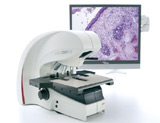Jul 21 2007
As the ability to diagnose disease through new histopathology technologies improves, the number of tissue sections a histopathologist needs to analyze each day increases.
 The Leica DMD108 makes work in histopathology more comfortable.
The Leica DMD108 makes work in histopathology more comfortable.
Leica Microsystems has designed a new network imaging solution that addresses not only the growing workload in today's busy histopathology laboratory but also the need to quickly share data. The Leica DMD108 offers an innovative solution for histopathologists that increases physical comfort, significantly speeds daily workflow without changing the process, and provides an easy-to-use network solution for sharing data. The solution has been extensively tested with pathologists to ensure that their daily requirements are met.
The Leica DMD108 makes work in histopathology more comfortable. The pathologist no longer needs to look through a microscope's eyepieces to view and analyze specimens. This results in a truly ergonomic working position. The Leica DMD108 system provides Leica's renowned, high-quality images directly on a monitor using a high-resolution camera and powerful image processing software. The Leica DMD108 generates high-resolution images with brilliant color fidelity that equal those produced using a conventional microscope.
Histopathologists can use the Leica DMD108 to photograph specimen details of interest or compare tissue sections. Images are easily stored with the click of a mouse and can be retrieved at any time. Size ratios are also calculated by a simple keystroke. The histopathologist can then audio-record the diagnosis directly onto the DMD108, and the diagnosis is ready for transmission.
The Leica DMD108 provides an ideal link between pathologists around the world. Now, holding live discussions about specific specimens is amazingly easy with Leica's new network imaging solution, and it is far more convenient than conventional discussion microscopes. A second monitor or high-resolution data projector can be added to the system for training, conferences, and tumor board discussions. Images can even be emailed during the work process; whenever a second opinion is required from a colleague who is not linked to the network.